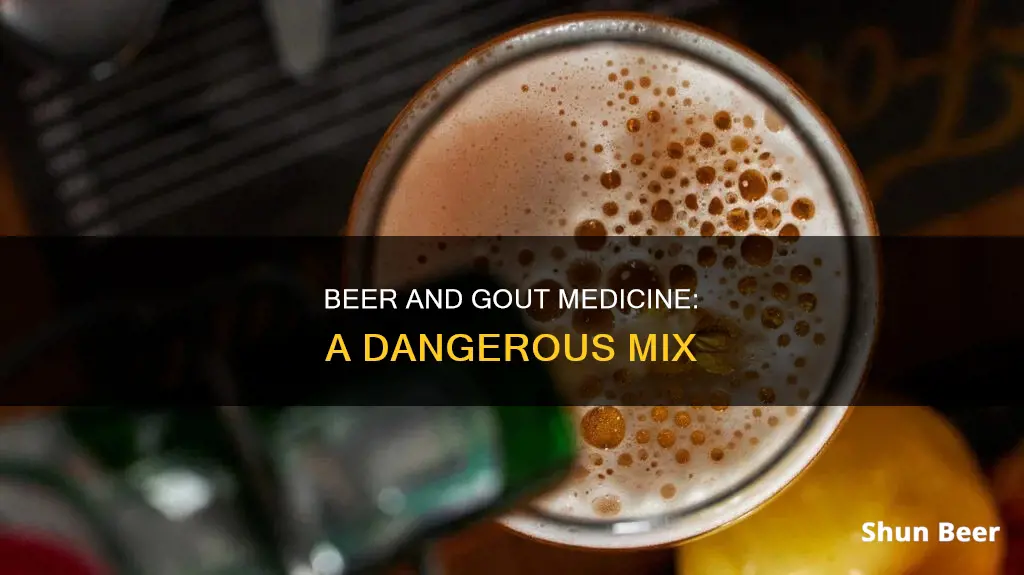
Gout is a form of inflammatory arthritis that develops in response to hyperuricemia, which is the medical term for excess uric acid in the blood. Beer and gout medicine can be a dangerous combination. Beer is high in purines, which are organic compounds that the body breaks down and converts to uric acid. Gout is caused by excess uric acid in the body, which crystallizes and accumulates within the joints, causing severe pain. Alcohol can increase uric acid levels in the body, resulting in gout flares. Therefore, it is recommended that people with gout or at risk of developing gout limit their alcohol consumption to prevent flares.
| Characteristics | Values |
|---|---|
| Beer's role in gout | Beer is high in purines, which are broken down into uric acid. Uric acid crystals in the joints cause gout. |
| Alcohol's role in gout | Alcohol affects the kidneys, reducing the amount of uric acid expelled in urine, which increases the amount of uric acid in the blood. |
| Beer compared to other alcoholic drinks | Beer has the highest purine content among alcoholic drinks. |
| Beer and gout attacks | Beer is strongly associated with gout attacks. |
| Beer and medication | Beer can be consumed with gout medication such as allopurinol, but only in limited quantities. |
What You'll Learn
- Beer is high in purines, which are converted to uric acid and can cause gout
- Alcohol affects kidney function, reducing the excretion of uric acid
- Beer drinking does not cause gout, but it does trigger attacks in sufferers
- Gout sufferers should limit alcohol consumption to prevent flares and episodes
- Gout medication can be taken to reduce uric acid levels in the body

Beer is high in purines, which are converted to uric acid and can cause gout
Beer drinking is a well-known gout trigger due to its relatively high levels of purines. Beer gets most of its purine content from brewer's yeast, which has about three times the purines of baker's yeast. While beer drinking does not necessarily cause gout, it can definitely trigger attacks in those who already have the condition. Studies have shown that men who drank one serving of beer daily were 50% more likely to have gout, and those who drank two or more servings were 2.5 times more likely to develop the condition.
The amount and type of alcohol consumed matter when it comes to gout risk. Research has shown that high alcohol consumption is an independent risk factor for developing gout. Once a person has gout, any amount of alcohol increases the risk of a flare-up. Beer, in particular, comes with the highest risk of triggering a gout attack compared to other alcoholic beverages. This is because beer is high in a type of purine called guanosine, which is converted to uric acid during digestion.
For those with gout, it is recommended to limit alcohol consumption, especially during a gout flare-up. While gout cannot be cured, managing the condition through lifestyle changes and medication can help improve quality of life.
Anxiety Meds and Alcohol: What's Safe to Mix?
You may want to see also

Alcohol affects kidney function, reducing the excretion of uric acid
Alcohol can have a detrimental effect on kidney function, which in turn can affect the excretion of uric acid. The kidneys are responsible for filtering metabolic waste products from the blood, such as alcohol, and maintaining the body's fluid composition. When alcohol is consumed, it can alter the structure and function of the kidneys, impairing their ability to regulate fluid and electrolyte levels in the body. This can lead to dehydration, which further impacts the normal function of cells and organs, including the kidneys.
Alcohol can also disrupt the hormonal control mechanisms that govern kidney function. It can interfere with the release of antidiuretic hormones, leading to increased urine production and disrupting the body's fluid balance. Additionally, alcohol's effect on kidney function can be direct or indirect. Acute and chronic alcohol consumption can directly affect kidney structure and function, while indirect effects occur as a consequence of liver disease, which is commonly associated with chronic alcohol consumption.
The impact of alcohol on kidney function is significant as it can lead to a range of disorders, from mild variations in fluid balance to acute kidney failure and even death. Alcohol consumption can also increase the risk of developing high blood pressure, which is a common cause of kidney disease. The kidneys of heavy drinkers have to work harder, and regular heavy drinking has been found to double the risk of developing chronic kidney disease.
In the context of gout, alcohol consumption can further elevate uric acid levels in the blood. Gout is a form of arthritis caused by high levels of uric acid crystallizing in the joints, resulting in pain and swelling. Alcohol affects the kidneys' ability to eliminate uric acid, leading to increased blood levels. This contributes to the formation of crystals in the joints, causing the intense pain associated with gout. Therefore, alcohol consumption, especially in excessive amounts, can worsen gout symptoms and increase the risk of gout attacks.
Beer and BV: A Cure or Just a Myth?
You may want to see also

Beer drinking does not cause gout, but it does trigger attacks in sufferers
Gout is a type of arthritis that affects the joints, causing pain, swelling, and stiffness. It is caused by hyperuricemia, which is the medical term for excess uric acid in the blood. This excess uric acid crystallizes and accumulates within the joints, triggering an inflammatory response. Gout typically affects the big toes and ankles, but it can also occur in the knees, elbows, shoulders, and knuckles.
While beer drinking does not directly cause gout, it can trigger attacks in those who already have the condition. Beer is high in purines, which are organic compounds that the body breaks down and converts into uric acid. This conversion process leads to increased uric acid levels in the body, resulting in gout flares.
According to Dr. Mark Jaffe, a rheumatologist, family history, genetics, and overall health play a bigger role than diet in how our bodies handle purines and uric acid. However, for those susceptible to gout attacks, beer and other high-purine foods and drinks can trigger flare-ups.
The link between beer and gout attacks has been supported by several studies. A 2014 study found that participants with gout who consumed one to two alcoholic beverages in a 24-hour period had a 1.36 times higher risk of experiencing a gout flare compared to those who consumed no alcohol. The same study also showed that consuming two to four alcoholic beverages in 24 hours increased the risk by 1.51 times.
Another study specifically examined the link between beer and gout. It found that men who drank one serving of beer daily were 50% more likely to develop gout, while those who drank two or more servings daily had a 2.5 times higher risk.
It is important to note that gout is a chronic condition, and recurrent flares are common. Close to 70% of people with gout experience at least one recurrent flare in a year. Therefore, it is recommended that individuals with gout limit their alcohol consumption, especially during a gout flare.
While beer drinking does not cause gout, it can be a significant trigger for attacks in those who already have the condition. Understanding and avoiding triggers are crucial aspects of managing gout and improving quality of life.
After-work beer: A harmless habit or a slippery slope?
You may want to see also

Gout sufferers should limit alcohol consumption to prevent flares and episodes
Gout is a form of inflammatory arthritis that develops in response to hyperuricemia, which is the medical term for excess uric acid in the blood. This excess uric acid crystallizes and accumulates within the joints, causing pain, swelling, and issues with mobility. Beer and other alcoholic drinks are high in purines, which are broken down into uric acid in the body. Therefore, consuming alcohol can increase the risk of a gout flare-up.
A 2021 review found that most studies linked gout to the consumption of alcoholic beverages, such as beer and spirits. The researchers recommended that people with gout, as well as those at risk of developing the disease, limit their alcohol consumption to prevent gout episodes or flares. This is especially important for people who are already taking medication for gout, as alcohol can interfere with the effectiveness of the treatment.
The National Institute of Alcohol Abuse and Alcoholism provides general guidelines for adults regarding drinking in moderation. They suggest that males should limit their alcohol intake to two drinks or fewer per day, while females should limit their intake to one drink or less per day. However, these guidelines may not be safe for people with gout, who may need to further limit their alcohol consumption or avoid alcohol altogether to prevent flares.
In addition to limiting alcohol intake, people with gout can make other lifestyle changes to help manage the condition. This includes maintaining a healthy body weight, eating a diet low in purine-rich foods, and treating any underlying conditions that can affect kidney function.
While it may be challenging for some people to limit their alcohol intake, it is important to prioritize gout management and overall health. For those who struggle, it is recommended to speak with a doctor for further advice and guidance.
Drinking Beer on the LIRR: What You Need to Know
You may want to see also

Gout medication can be taken to reduce uric acid levels in the body
Gout is a type of inflammatory arthritis that develops in response to hyperuricemia, or excess uric acid in the blood. This excess uric acid crystallizes and accumulates within the joints, causing pain, swelling, and issues with mobility. Gout typically develops in stages; in the first stage, uric acid levels are rising but not yet causing symptoms. In the second stage, the individual experiences painful gout attacks, known as flares. As gout progresses, it becomes chronic, affecting more joints over time.
In addition to medication, lifestyle changes can also help manage gout and reduce uric acid levels. Doctors often recommend weight loss, increased water intake, and dietary modifications. Avoiding certain foods and beverages that are high in purines, such as beer, can help prevent gout attacks. Purines are organic compounds that the body breaks down into uric acid. Alcohol, particularly beer, interferes with kidney processes, impacting how uric acid is eliminated in urine. This leads to elevated blood levels of uric acid, increasing the risk of gout flares.
It is important to note that gout is a genetic disease, and dietary changes alone may not be sufficient to control it. However, in combination with medication, lifestyle modifications can be effective in managing gout and reducing the frequency and severity of flares.
Beer Left Out Overnight: Still Good or Not?
You may want to see also
Frequently asked questions
Gout is a form of inflammatory arthritis that develops in response to hyperuricemia, which is the medical term for excess uric acid in the blood.
Beer is high in purines, which are organic compounds that the body breaks down and converts to uric acid. Gout medication reduces the production of uric acid in the body. Therefore, drinking beer while taking gout medicine may reduce the effectiveness of the medication.
Gout symptoms include sudden and severe joint pain (especially in the fingers and toes), swelling, stiffness, and a mild fever.
In addition to beer, other foods and drinks that are high in purines and should be avoided include organ meat (such as liver), crustaceans (such as shrimp and crab), sugar-sweetened beverages, and orange juice.
Yes, there are non-alcoholic alternatives to beer such as non-alcoholic seltzers and mocktails (also called zero-proof beverages). However, it is important to avoid alternatives that are sweetened with sugar, fructose, or high-fructose corn syrup, as these can also raise uric acid levels.







